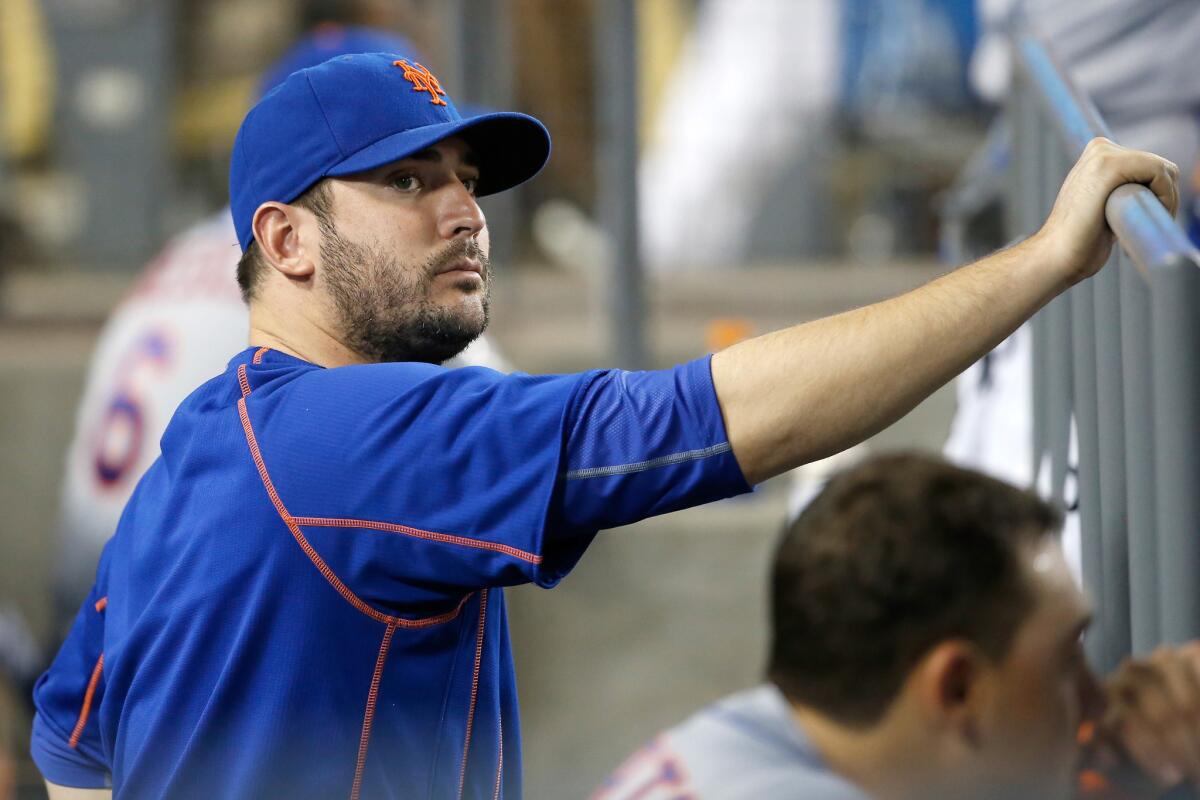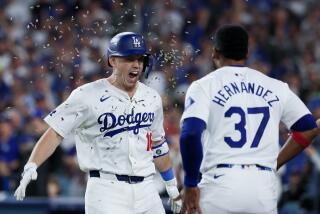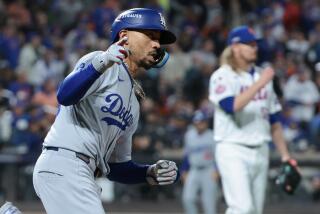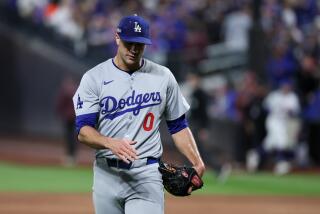After much drama, Mets’ Matt Harvey is set to face Dodgers in playoffs

Mets starting pitcher Matt Harvey looks on from the dugout during Game 2 of the National League Division Series at Dodger Stadium.
Reporting from NEW YORK — When the Dodgers slotted their starting pitchers for the playoff series against the New York Mets, their first question was the most logical one: Who do we start in Game 1?
When the Mets slotted their starting pitchers, their first question was different: Where do we put Matt Harvey?
September should have been an entirely joyous month for the Mets, all about celebration and anticipation for their first October in nine years, and about turning loose the most potent young arms in baseball on the national stage. Instead, the month deteriorated into a he-said, he-said sniping match between Harvey’s agent, Scott Boras, and the Mets’ general manager, Sandy Alderson, about the proper care and handling of Harvey.
Harvey and the team arrived at a truce. Harvey will pitch in the postseason, but not as often as he otherwise might have.
Manager Terry Collins calls him “the ace.” Harvey got Game 3, to ensure he would start only once. Then the Mets decided on who would start the first two games, giving the team the option to use those starters twice in the series.
This is all about the innings, for both of the starters in Monday’s Game 3.
Brett Anderson, the Dodgers’ starter, has thrown 180 innings, more than he has thrown in any season of his career, more than he had thrown in the previous three seasons combined. Two of his last three starts were hideous. The Dodgers have little choice and lots of hope.
Boras said he and the Mets had agreed on a 180-inning limit for Harvey this season, his first after elbow ligament-replacement surgery, playoffs or no playoffs. Alderson said the agreement called for about 185 innings, independent of the playoffs.
For a few tense weeks, every scheduled Harvey start was preceded by ‘Will he or won’t he? And for how long?’
Finally, Harvey told Collins that he wanted to pitch in October, without artificial limits once he got there.
“Here’s a guy who I know, in his heart, wanted to be on that mound,” Collins said. “People he respected said, ‘You can’t do this.’ It scared him.
“I knew where Matt was coming from. Old school? You bet your [butt]. That thing would have cost the other 24 guys in that room something? They would have been [ticked]. And I don’t blame them.”
Boras said last month that the 180-inning limit for Harvey came from Dr. James Andrews, who performed the operation. The logic, Boras said, was that Harvey should not exceed his previous career high for innings in his first year back from surgery.
Harvey is at 189 innings. If the Mets advance to the National League Championship Series and Harvey gets a start in that series, he would figure to hit 200 innings.
Boras, speaking before Friday’s division series opener at Dodger Stadium, declined to say whether he thought the Mets were putting Harvey at undue risk.
“I just want to focus on the game and let them do what they’re going to do,” Boras said.
Boras said he believed all the parties involved were trying to do the right thing. He also said the issue extended beyond Harvey, given the epidemic of elbow procedures.
“This is a conundrum baseball itself has to deal with,” Boras said. “I don’t think it really applies so much to individuals. It’s the sport in general — how we manage it, how we listen to doctors, what we do.”
In 2012, when the Washington Nationals shut down Stephen Strasburg in his first season after a similar surgery, and with the team bound for the playoffs, the doctor that performed the surgery said there was no data that provided conclusive information about whether Strasburg’s long-term health would be best served by shutting him down.
“There’s no statistic as far as studies,” Lewis Yocum said then.
Yocum was not questioning whether the Nationals were doing the right thing, just saying there was no way to prove it. Yocum has since died, but athletic trainers collecting that very data say it still could be years before a Strasburg or a Harvey could be told, “Do this, because the statistics back it up.” When a doctor is quoted publicly saying otherwise, or recommending a particular number of innings for a pitcher that is not his patient, the fraternity of athletic trainers gets increasingly enraged.
“We try to approach it with medical input,” Alderson said, “and with a view of the best interest of the team, as well as the best interest of the player.
“Those two things are never going to align perfectly. We admit that. But that is what we try to do, figure out what is a good plan that is in the best interest of the team and the player. I would never argue that our interests don’t diverge from time to time, but we make the effort to keep those things as close as we can.”
Harvey made 29 starts in the regular season, all but 10 with more than four days of rest. He made 178 fewer pitches than Jacob deGrom, the Mets’ Game 1 starter, and 594 pitches fewer than Clayton Kershaw, the Dodgers’ Game 1 starter.
For a few weeks there, Mets players did not know whether Harvey would pitch in the playoffs. For a few weeks in 2012, Nationals players knew for sure that Strasburg would not pitch in the playoffs.
“We knew Stephen was going to get run out there every five days, make his starts, and at 160 innings, he was going to get shut down,” said Mets reliever Tyler Clippard, who played for the 2012 Nationals.
“As the season progressed, and we were in first place and playing really well, a lot of us were looking around and saying, ‘Maybe they should shut him down [now] and conserve his innings. This is a special guy and a special team. These opportunities don’t come around very much.’ That was the vibe.
“They stuck to their guns, which I respect. I can see both sides of it. But he did get shut down, and it did take a little bit of that edge that we had, because he was such a huge part of that rotation.”
Without Strasburg, the Nationals lost in a division series. With him two years later, they also lost in a division series.
From the perspective of the clubhouse, Clippard said, the Mets have handled the Harvey situation better than the Nationals handled the Strasburg situation.
“It’s been great,” Clippard said. “The Mets did a good job of conserving Matt when they could. Matt’s done a great job, as far as letting his teammates know where he stood and made us feel comfortable that he was going to be there for us in the playoffs. That kept our morale, our vibe, way better than what we had in 2012.”
Harvey, speaking last week at Citi Field, politely declined to discuss the issue of how many innings he would, or should, pitch.
“I think I’m done talking about that,” he said. “I think everybody is kind of sick of that. We’re concentrating on the playoffs and we’re all ready to go. We’ve put all that behind us.”
And then, dressed in a black pullover with the Boras Corp. logo, he walked into the dark night.
More to Read
Are you a true-blue fan?
Get our Dodgers Dugout newsletter for insights, news and much more.
You may occasionally receive promotional content from the Los Angeles Times.










